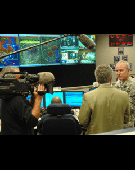Two conferences taking place in Europe, this weekend, trace new political movements in the field of media theory. Both consider the role of representation in entrenching or perpetrating war. 'Under Fire' (underfire.eyebeam.org) at Spain's University of Seville, in partnership with the city's International Biennial of Contemporary Art, focuses on war and armed conflict, with a special component on media (mis)representations of Islamic culture. At Genoa, Italy's Villa Croce Contemporary Art Museum, a conference entitled 'Resistant Maps: artistic actions in the interconnected urban territory' looks to cartography, that medium long problematized by postmodern scholars, for answers to questions about shifting balances of agency. Taking as its premise the idea that the 'representation of territory holds a historical role in the privileges of power,' participants will consider the role of psychogeography, new locative media devices, and other means of redrawing lines in reclaiming contested space. The two conferences seem catalyzed by current struggles in the Middle East, and the lineup for both features some of the most active media ecologists and activists in the field, including Jordan Crandell, Friedrich Kittler, Ana Valdes, and Eyal Weizman at 'Under Fire,' and Vittore Baroni, Nicola Bucci, Brian Holmes, and Alessandro Ludovico, at 'Resistant Maps.' The latter also coincides with an exhibition featuring work by Cartografia Resistente, Giuseppe Chiari, Guy Debord, and others, bringing a deeper artistic context to intervention. All in all, the conferences reflect a refreshing movement towards engagement with contemporary political issues and an effort to think not only of how new media contributes to these issues, but also how it might adequately address them. - Marisa Olson
